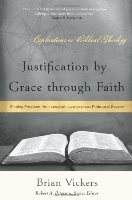Ten Quotes
- God says to his creatures, “Have children, tame the earth, and rule over it.” There is work to be done in this good creation. It appears from the outset that there is a goal to reach. Presumably the earth could reach a state of being filled, tamed, and ruled. A divinely appointed goal is woven into creation. (12)
- The “if Adam had obeyed” question is driven by the recognition that a goal is built into creation…. But however much the inference is a fair one, it is important that we remember that the real goal was never for the human race to be perfected in Adam (no plan B!)…. “He didn’t obey, and that is precisely the point. God’s goal was not in Adam but in another through whom the people of God would truly be perfected and reach their appointed goal.” (19)
- If we grasp the depth of our connection to Adam, then we will understand that what is his, namely sin and death, is ours. Our personal sins bear witness to our connection with Adam’s sin and to the punishment (death) that God brought on the world as a result. Paul’s main focus in this text is not on us but on the two men whose actions affect everyone aligned with them. (36)
- Every act of obedience is, by necessity, both active and passive. The same is true of Christ’s obedience—in life and in death. Christ’s obedience must be understood as simultaneously active and passive. (41)
- The pairing righteous with made [in Rom. 5:19], according to the way it’s defined here, is nothing short of staggering: through the obedience of Christ, God judges those connected (by faith) to Christ, who own him as their covenant head, as having fully accomplished all manner of righteousness in his eyes. If we grasp the depth of our connection to Christ, then we will understand that what is his, namely life and righteousness, is ours. (49)
- When we hear the word justification, our thoughts should not go first to things like the role of faith and works, justification in an order of salvation, the eschatological nature of justification, or much less whether we are up to speed on all the latest discussions and debates. All these things are important, but we must remember that the prior issue is what Christ has done for us in his life and death. (49-50)
- Any reckoning of righteousness must include a positive imputation of righteousness as part of being justified. Paul is speaking of earning the positive status of righteousness in contrast with faith counted as righteousness—also a positive status. (80)
- So while forgiveness is emphasized and may be the primary thing mentioned in a text, justification before God always assumes positive obedience, not only the erasing of the debit side of the ledger. (84)
- The law is neither an end nor a beginning but a crucial step in God’s redemption. (95)
- Paul does not condemn anyone for having a high regard for the law; he condemns people for trying to use the law to establish their own righteousness (99)
Table of Contents
Introduction
1. The Legacy of Adam
2. The Obedient Second and Last Adam
3. Not by Sight: Abraham and the Righteousness of Faith
4. Abraham: Our Father according to the Faith
5. The Law: Things by Which You Cannot Be Justified
6. God’s Righteousness and Ours
7. Faith Works: The Life of the Justified
8. Freedom: Justification Applied
Conclusion: The Biblical, Central, and Practical Doctrine of Justification
Questions for Study and Reflection
Check out our interview with the author here!
Buy the books

Justification By Grace Through Faith: Finding Freedom From Legalism, Pride, And Despair